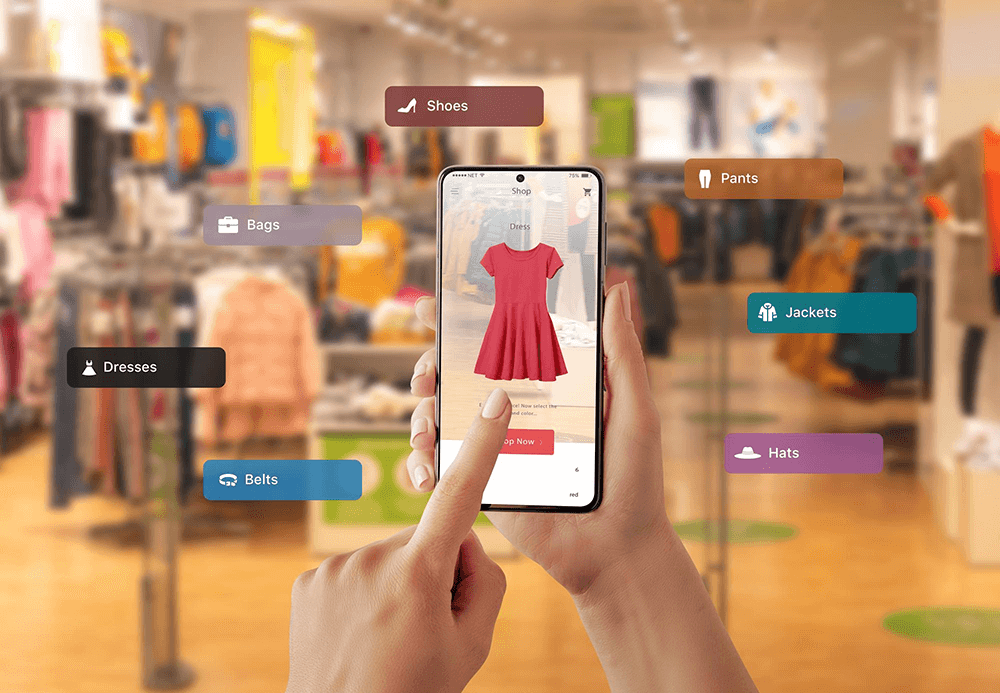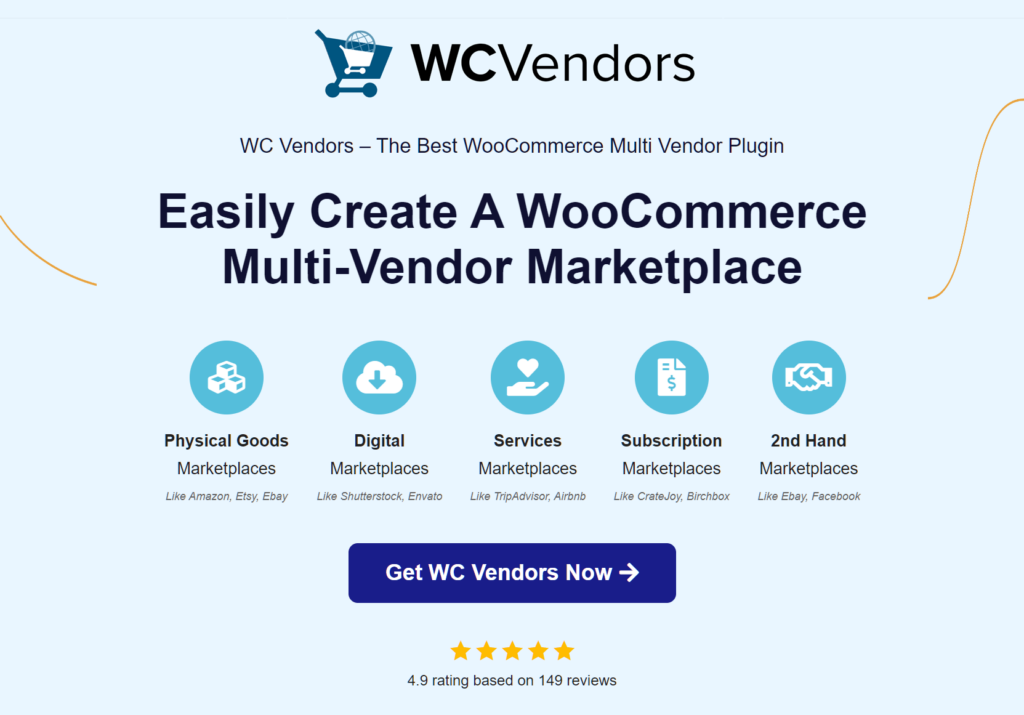
The multi-vendor marketplace industry, known for platforms like Amazon, eBay, and Etsy as prominent online marketplace examples, has grown in tandem with e-commerce as a whole. Experts predict that this sector will grow to nearly $10 trillion by 2027.
This stands in stark contrast to other industries that even today are still having a challenging time bouncing back from the pandemic. During the height of the COVID-19 scare, customers showed a heightened interest in online shopping, as many were reluctant to risk visiting brick-and-mortar stores. Now, with the reopening of businesses, they continue to prefer the convenience and efficiency offered by the marketplace model.
Accompanying the expansion of this model, notable industry innovations have emerged, which provide valuable insights for new marketplace owners eager to explore the realm of possibilities. Thus, we have curated a list of the top 10 online marketplace examples to showcase.
Some will sound familiar. Some, probably not. However, each demonstrates the vast potential of multi-vendor marketplaces.
Ready to learn more? Then read on!
5 Online Marketplace Examples: The Heavy Hitters
You’ve probably heard the names of the most popular online marketplaces already. However, their prevalence doesn’t diminish their importance.
The following five online marketplace examples expanded people’s imaginations about what the internet can do, showing its true power and potential as well as changing online shopping for everybody:
1. Amazon Marketplace
You can’t talk about groundbreaking online marketplace examples without mentioning Amazon. You already know about the massive online store founded by Jeff Bezos in the ’90s. However, don’t let this familiarity fool you into missing some of the things that make this platform so cutting-edge.

The brand sets the standard for convenience. Remember when you used to have to pay for shipping? Amazon was among the first to throw that out with their Amazon Prime memberships. And, speaking of Prime, don’t forget about that genius invention of a loyalty program.
Prime members pay a yearly fee to the marketplace to spend more money on that same marketplace. But it works because the simple perks like free same-day shipping and exclusive shopping events give their loyal customer base what they actually want.
Every new digital marketplace that has come after Amazon has followed in its footsteps in one way or another. As you think about creating yours, study the industry leader and see how you can incorporate its strategies into your approach.
2. eBay
The online auction site helped set the stage for every e-commerce marketplace that followed in its footsteps. What started as a hobby for computer programmer Pierre Omidyar eventually evolved into one of the most successful online marketplaces.
What’s extremely impressive about eBay is its ability to pivot over time. The whole auction concept helped put the platform on the map, but that model doesn’t work well with modern consumers looking for convenience and efficiency.
Therefore, the site eventually added a “buy now” button that allows customers to skip the bidding wars for specific items. Although auctions still play a role, they’re no longer the sole star of the show.
3. Etsy
Niche markets have become a popular category for people looking to start their own marketplace. Many people in the field even consider developing a niche an essential part of building a marketplace business.
A pioneering platform that began blazing the trail in 2005, Etsy stands out as one of the best niche online marketplace examples. It created a multi-vendor shopping hub that didn’t try to do everything, instead focusing on handcrafted goods and establishing itself as a dedicated space for artisans and creators. And it hasn’t stopped growing since then.

This strategic decision allowed Etsy to carve out a unique niche in the market. In addition, it brings together a community of people who love and value the unique craftsmanship found in handmade goods.
Etsy’s continued growth proves that meeting the specific needs and preferences of a particular group of buyers can be a successful strategy.
4. Walmart
Walmart gets a mention because of its ability to adapt to the new world. The brand started in 1962. To put that in perspective, the first Beatles record didn’t come out until the year after. However, like Paul McCartney, Walmart has continued to keep itself relevant year after year.
For most of Walmart’s existence, e-commerce wasn’t around. In fact, it didn’t become a high-performing online marketplace until the past decade or so. And yet, despite this modernization, the corporation has maintained a solid physical presence.
As other stores see the advantage of online selling, we’ll likely see more sellers follow in Walmart’s footsteps, trying to get the best of both worlds.
5. Airbnb
Do you remember when you first heard about Airbnb? People had their doubts. “Why would I ever stay in a stranger’s house when I can just stay at a hotel?” skeptics asked, questioning the safety and functionality of such a model.
Today, over 150 million people have used the platform to book their vacations across thousands of cities worldwide. All that became possible through an innovative marketplace.

Airbnb’s trio of founders thought creatively about what the marketplace model could do for them and others. They used a simple idea to incentivize everyday people to casually enter the hospitality industry with their spare rooms, airstreams, second homes, and other properties. The result? Astounding success!
5 Examples Of New Online Marketplace Opportunities
The five big marketplace examples we covered share one major thing in common: each looked for ways to innovate in the industry. In other words, they sought new opportunities in the market and capitalized on what they could do.
Here we’ll cover five more recent examples of marketplace innovation:
1. Farmers’ Markets
The COVID-19 pandemic rocked the food and grocery industry. Restaurants and grocers around the world had to rethink their operations. Ultimately, many began to offer delivery or curbside pickup.
Farmers’ markets have had a similar need to pivot, and some have chosen the route of e-commerce marketplaces.

Brands like The Farmers Marketplace offer fresh produce, meat, eggs, and other mainstays of the neighborhood farmers market, all in an online setting. They offer delivery or in-person pickup to people in their selected regions.
In addition, these platforms utilize local vendors just like they did when they had booths set up in the downtown square. Only now, shopping is even more convenient for consumers.
2. Shopping Malls and Strip Malls
The mall once represented a cultural meeting place for people of all ages. Unfortunately, its popularity has largely subsided as e-commerce has grown. Mix the global pandemic into the equation, and you end up with a ton of malls closing around the world.
The ones that survive have pivoted their business, and some have seen the e-commerce marketplace as their new destination. That’s what happened with Miami’s Bal Harbour Shops, a collection of luxury stores that innovatively merged its traditional physical retail setting with an engaging virtual experience.
The same stores and vendors from the physical mall also make up the digital marketplace.
Thanks to this development, customers today now have the choice to shop how they want to. That kind of awareness of consumer desires is what makes any marketplace successful.
3. Sporting Goods
The sporting goods industry is another great niche for emerging marketplaces to explore. And those heading in that direction can look to brands like MuskyChasers for inspiration.

The brand exemplifies various aspects of a thriving marketplace:
- A hyper-niche audience
- A community built around a shared interest
- Content that equips and resources visitors
- An online marketplace that provides products that customers want.
That’s how you do it.
4. High-End Luxury Retail Items
Sites like TheRealReal have combined the resale marketplace model with luxury fashion. It has tapped into a great niche, and its site contains thousands of products ranging from watches to sneakers to designer handbags.
Here is a list of just a few of the high-end brands included:
- Prada
- Gucci
- Louis Vuitton
- Chanel
- Balenciaga
The best part?
The site has a simple “Sell With Us” button that makes it easy for vendors to add product listings to the marketplace.
5. Green Consumerism
Consumers have shown an increased desire to back brands that believe in something in the last few years. One of the most significant areas that people have rallied behind is the idea of buying sustainable, eco-friendly products.

Indeed, the “green consumerism” movement has seen customers:
- Spend more money on eco-friendly products
- Switch from less consumer-conscious brands to those more engaged in sustainability
- Stay with brands for more extended periods
In 2021, the Forest Stewardship Council responded to this movement by launching One Simple Action, a marketplace full of certified products sourced from responsibly managed forests.
This brand models what it looks like to create a marketplace that revolves around your customers’ more profound beliefs and ideologies rather than simply bringing them in with products. Emerging online marketplaces can apply that same idea to other initiatives potential customers have a passion for.
Building Your Online Marketplace
These online marketplace examples can inspire the next movement of multi-vendor shopping hubs. As you build your innovative contribution to the industry, you’ll need the right tools to get you started.
WC Vendors exists to help you launch and scale online marketplaces. Thousands of users around the world have trusted our easy-to-use software. If you’d like to learn more about how our platform can help you succeed, reach out to us today. We’d love to hear your big idea.
Conclusion
There are many great online marketplace examples out there, which is awesome news. After all, exploring the most successful among them can offer valuable insights into determining which strategies to adopt for your own marketplace endeavors.
To recap, extremely successful online marketplace examples include:
As for new online marketplace examples, check out:
- Farmers’ markets
- Shopping malls and strip malls
- Sportings goods
- High-end luxury retail items
- Green consumerism
Would you like more online marketplace examples? Reach out to us and let us know!
